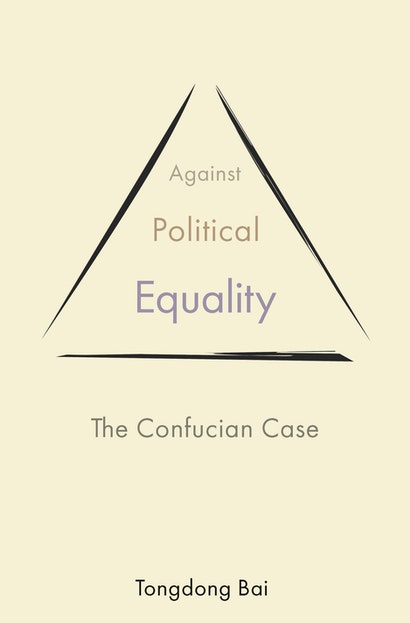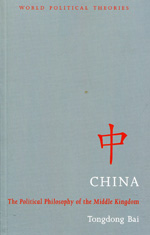Against political equality
the Confucian case
- ISBN: 9780691230207
- Editorial: Princeton University Press
- Fecha de la edición: 2021
- Lugar de la edición: Princeton. Estados Unidos de Norteamérica
- Encuadernación: Rústica
- Medidas: 23 cm
- Nº Pág.: 315
- Idiomas: Inglés

What might a viable political alternative to liberal democracy look like? In Against Political Equality, Tongdong Bai offers a possibility inspired by Confucian ideas.
Bai argues that domestic governance influenced by Confucianism can embrace the liberal aspects of democracy along with the democratic ideas of equal opportunities and governmental accountability to the people. But Confucianism would give more political decision-making power to those with the moral, practical, and intellectual capabilities of caring for the people. While most democratic thinkers still focus on strengthening equality to cure the ills of democracy, the proposed hybrid regime—made up of Confucian-inspired meritocratic characteristics combined with democratic elements and a quasi-liberal system of laws and rights—recognizes that egalitarian qualities sometimes conflict with good governance and the protection of liberties, and defends liberal aspects by restricting democratic ones. Bai applies his views to the international realm by supporting a hierarchical order based on how humane each state is toward its own and other peoples, and on the principle of international interventions whereby humane responsibilities override sovereignty.
Exploring the deficiencies posed by many liberal democracies, Against Political Equality presents a novel Confucian-engendered alternative for solving today’s political problems
Why Confucianism? Which Confucianism? 1
Has History Ended? Message from a Rising China 1
Which Confucianism? 3
The Philosophical Approach to Early Confucianism 5
Can Early Confucian Texts Be Read Philosophically? 9
How to Read Early Confucian Texts Philosophically 13
Early Confucianism as a Modern Political Philosophy 19
2 Confucianism on Political Legitimacy: For the People, of
the People, but Not by the People 32
Confucian Equality 32
Confucian View of Political Legitimacy: Of the People, for the
People . . . 34
. . . But Not by the People 43
The Confucian Middle Way: Between Equality and Hierarchy,
and between Mobility and Stability 47
3 A Confucian Hybrid Regime as an Answer to Democratic
Problems 52
Four Problems with Democracy 52
Nonmeritocratic Solutions and Their Fundamental Limit 58
The Confucian Hybrid Regime 67
4 The Superiority of the Confucian Hybrid Regime Defended 83
Internal Challenges to the Superiority of the Confucian
Hybrid Regime 83
Incompatible with Liberal Democracy? 97
5 Compassion as the New Social Glue in the Society
of Strangers 110
Introducing Humaneness and Compassion 110
Compassion as a Modern Virtue 114
The Cultivation of Compassion: From What Is Near to the
“Transcendent” and the “Eternal” 125
The Hierarchy of Universal Care 133
Effectiveness of Compassion 135
6 Conflict in the Expansion of Care: The Private versus
the Public 138
The Issue of the Private versus the Public 138
Early Confucians’ Solutions 140
Han Fei Zi’s Challenges 149
An Alternative Model in the Republic 154
Comparisons between the Two Models 159
A Confucian Criticism of the Contemporary Evasion of Virtue 165
A Confucian Argument for Gender Equality 171
7 Tian Xia: A Confucian Model of National Identity and
International Relations 175
Patriotism Justified and Restrained 175
The Civilized and Barbaric Distinction and a Confucian
World Order 180
Is Nation-State the Only Path to Modernity? 187
Confucian Model versus Nation-State Model 191
Confucian Model versus Cosmopolitan Model 198
Treatments of Some Practical Problems in China 207
8 Humane Responsibility Overrides Sovereignty: A Confucian
Theory of Just War 214
A City on a Hill: “Isolationism” as International Intervention 214
The Strength of the State and the Justice of War 217
The Self-Preservation of a Humane but Small State 220
The Duty to Protect by a Humane and Powerful State 223
A Mencian Theory of Just War 226
Compared with “Human Rights Override Sovereignty” and
the Responsibility to Protect 230
Problems with Mencius’s Theory 234
9 A Confucian Theory of Rights 240
Four Camps on the Compatibility between Confucianism and
Liberal Democracy 240
Problems with Democratic Ideas as the Metaphysical Foundation
of Liberal Democracy 245
A Revised Rawlsian Answer 249
Confucian Rights 257
An Example: Confucian Animal Rights 268
Compatibility between a State’s Promotion of Virtue
and Liberalism 278
Postscript 285
Environmental and Technological Challenges: A Synthetic Answer 285
Realizing the Confucian Alternatives? 288








